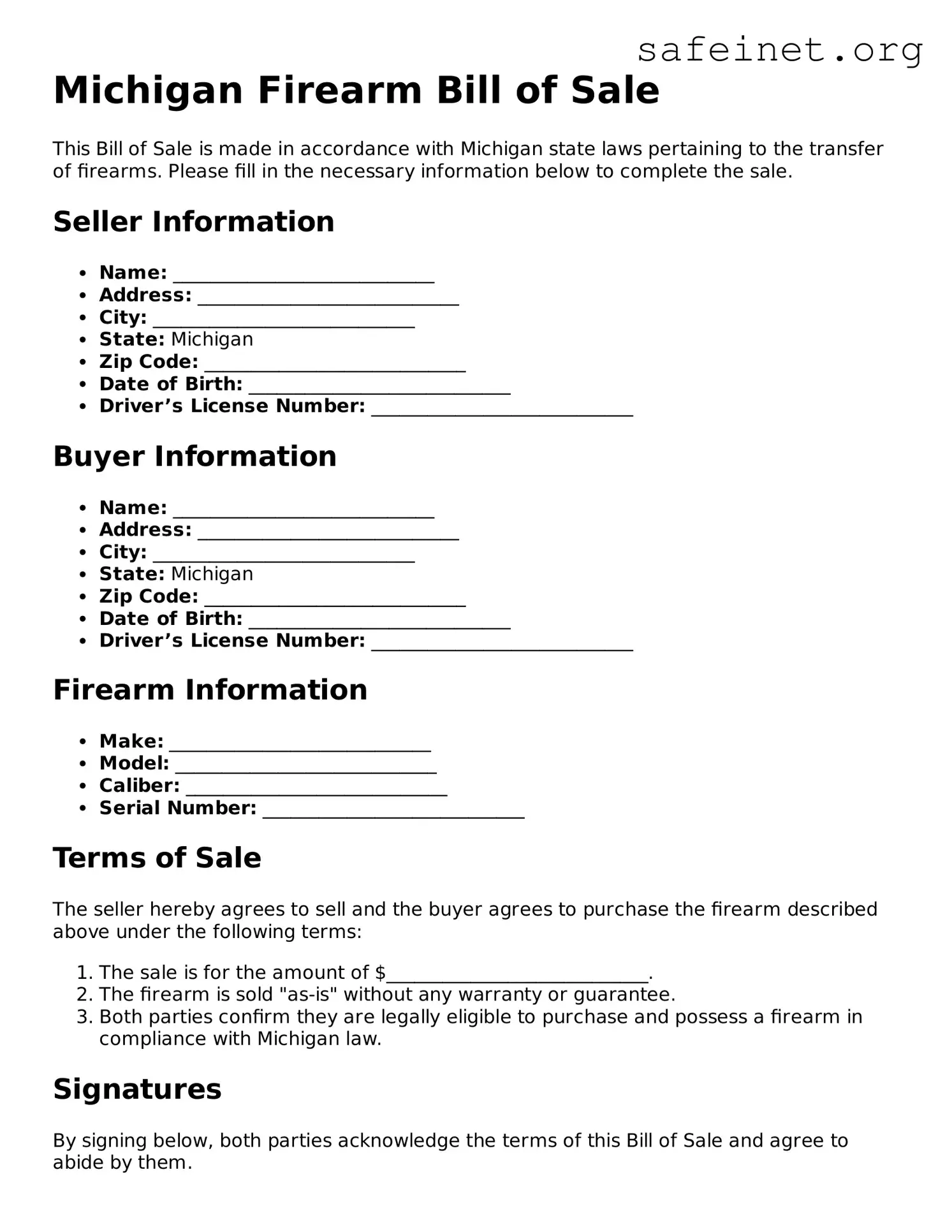What is a Michigan Firearm Bill of Sale form?
A Michigan Firearm Bill of Sale form is a document that records the sale or transfer of a firearm between two parties in Michigan. It serves as proof of ownership and provides details about the firearm, including its description, and the buyer and seller information. This form can be especially useful for providing legal protection and ensuring a clear record of the transaction.
Is a Bill of Sale required for firearm transfers in Michigan?
While a Bill of Sale is not legally required for private firearm transactions in Michigan, it is strongly recommended. Having a Bill of Sale can help clarify ownership and protect both the buyer and seller in case of any disputes in the future. It also ensures all necessary details of the transaction are documented.
What information should be included in the Firearm Bill of Sale?
A comprehensive Firearm Bill of Sale should include the following information: the names and addresses of both the buyer and seller, the date of the transaction, a detailed description of the firearm (including make, model, caliber, and serial number), and any other relevant details. Both parties should also sign and date the form to validate the transaction.
Where can I obtain a Michigan Firearm Bill of Sale form?
You can find a Michigan Firearm Bill of Sale form online, often as a free downloadable template. Various legal websites and resources provide customizable forms. Ensure that the form you choose meets Michigan's requirements and is suitable for your transaction.
Do I need a notary for a Firearm Bill of Sale in Michigan?
A notary is not required for a Firearm Bill of Sale in Michigan. However, having the document notarized can add an extra layer of legitimacy and may be beneficial if you ever need to prove the sale or ownership later on.
Can a Firearm Bill of Sale be used for multiple firearms?
Yes, a Firearm Bill of Sale can include multiple firearms in a single transaction. In such cases, it is essential to provide a clear description of each firearm, including make, model, caliber, and serial number. This way, both parties have a record of all items involved in the sale.
What happens if I lose my Firearm Bill of Sale?
If you lose your Firearm Bill of Sale, it’s important to try to obtain a copy from the other party involved in the transaction. If you cannot get a copy, you may not have formal proof of sale, which could complicate future ownership claims. Keeping a secure and accessible record of important documents is always a good practice.
Does the buyer need to be a Michigan resident to purchase a firearm?
The buyer does not necessarily need to be a Michigan resident to purchase a firearm in Michigan. However, all firearm transactions must still comply with federal and state laws. The buyer may need to complete a background check and comply with additional regulations based on their state of residence.
Can I sell a firearm to someone without a background check?
In Michigan, private sales between two individuals usually do not require a background check. However, it is advisable to conduct a background check to ensure the buyer is legally eligible to own a firearm. Be aware of any specific rules that may apply to sales to individuals who live in other states.
What should I do if the firearm I sold was later involved in a crime?
If a firearm you sold becomes involved in a crime, it is crucial to have a record of the Bill of Sale to establish your proof of sale and distance yourself from the incident. Contact law enforcement if necessary and provide them with the Bill of Sale, along with any other information they may require to assist with their investigation.
